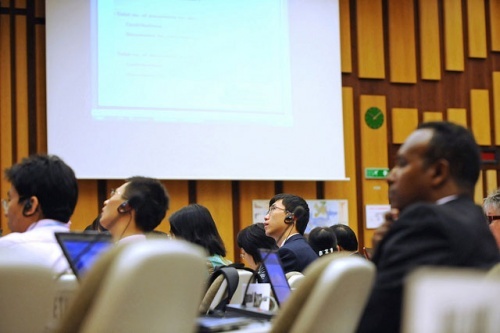
Globally-recognized set of methodologies to assess the environmental impact of information and communications technologies (ICTs), and on preparing a report on guidelines on the use of minerals from conflict areas has been reached according to the United Nations International Telecommunications Union (ITU). At a meeting in Seoul, Republic of Korea, Seoul, ITU’s study group of the telecommunication standardization sector (ITU-T) agreed on the production of a report on due diligence guidelines for conflict minerals supply, and on an assessment of environmental protection and recycling solutions for batteries for mobile telephones and other ICT devices. (From ITU & UN News Centre)
Carbon Footprint of Mobile Phones & Other ICT Devices:
Estimates of how much ICTs can reduce global emissions, and estimates of emissions generated by the ICT sector itself, still vary widely due to the application of different measurement methodologies.
The problem was raised by delegates to the ITU symposium on ICTs and climate change in 2008, after which ITU took on the challenge and pioneered the adoption of a new globally-agreed set of standards. To ensure consistency between different approaches, the new methodology has been developed in cooperation with other standardization organizations. The new methodology is also aligned with the Digital Agenda of the European Commission. “This methodology has been developed by ITU’s industry members. This will be important in ensuring it gains wide acceptance by the world’s ICT industry,” said Hamadoun Touré, the ITU Secretary General. “An internationally agreed methodology means estimates of the impact of ICTs on greenhouse gas emissions and energy consumption will now have much greater credibility. It will also show just how significant a contribution ICTs can make by reducing global emissions in other sectors.”
Conflict Minerals – Rare Earth to Precious:
The new ITU work on ‘conflict minerals’ will also begin in response to a request from the Democratic Republic of the Congo (DRC). ITU will make a survey of existing due diligence requirements and guidelines concerning sources of conflict minerals – particularly those that are smelted into tin, tantalum, tungsten and gold – as well as their use in conformity with recognized international treaties and national legislation. Rare earth minerals are used in consumer electronics products such as mobile phones, DVD players, video games and computers. Agreement to address this issue is a demonstration of the ICT industry’s commitment to sustainability at all levels of the value chain, according to ITU.
Following the success of ITU’s Universal Charging Solution for mobile devices, the meeting also agreed to study the benefits and disadvantages of the standardization of batteries for mobile terminals and other ICT devices, looking at energy efficiency over the battery life cycle, eco-design information, battery lifetime and exchangeability, safety and environmental protection, recycling and reuse. This could lead to a reduction of harmful materials used in batteries and an increased lifespan of ICT products. Battery manufacturers, device makers, operators and users will all benefit, according to experts.
ARTICLE – “Climate Change Team Organizes” –
diplomaticallyincorrect.org/films/blog_post/climate-change-technology-team-organizes-by-ambassador-mo/34947
By Ambassador Muhamed Sacirbey
Facebook – Become a Fan at “Diplomatically Incorrect”
Twitter – Follow us at DiplomaticallyX
More at Ecology-Diplomat -
diplomaticallyincorrect.org/c/ecology-diplomat/most_recent/1

